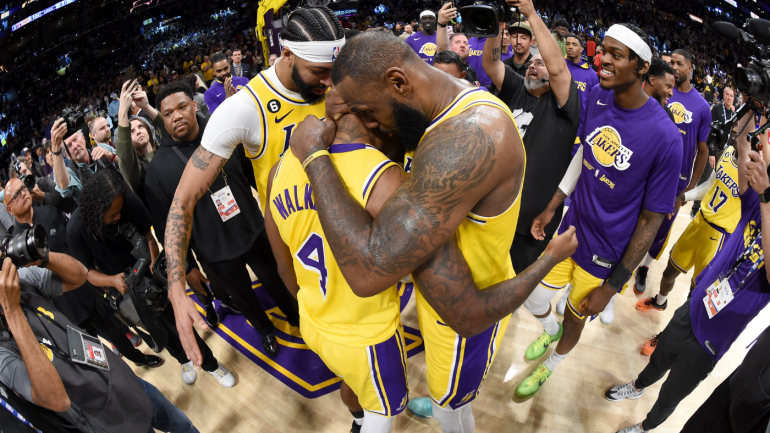Walker finished Game 4’s fourth quarter with all 15 of his points.
The Los Angeles Lakers have frequently been saved by Lonnie Walker IV. Let’s go back in time to November. The Lakers are currently 2-10. James Lebron is hurt. Dennis Schroder hadn’t even made his team debut, Russell Westbrook was still a member, and Troy Brown Jr. was starting. Any further defeats at that moment might have meant the season was over. Walker stopped all. Walker helped the Lakers get back up to 7-11 in the following six games, averaging 19.5 points per game on 51/46/94 shooting. In the process, he gave James and the rest of the roster the time they needed to gel as well as the time they both needed to become healthy. Without Walker, it’s likely that the Lakers wouldn’t have advanced to the playoffs.
And if Walker hadn’t been there? The Lakers might be facing elimination at this very moment. In the second half of Game 4, the Lakers were down by as many as 12 points to the Golden State Warriors. After three quarters, they were down seven. Losing would have resulted in the Warriors losing their home-court advantage. This season, Golden State had a 33-8 record at home. This playoffs, the Lakers are unbeaten at home. Winning all of their home games gave them the best chance of making it to the Western Conference finals. In Los Angeles, the Warriors came the closest to defeating them of any team in this postseason.
They then encountered Lonnie Walker IV. He had no points when the fourth quarter started. He had 15 when it was over. The last time a Laker reserve scored 17 points in the fourth quarter of a game against the Utah Jazz in 1997, he was a little-known rookie named Kobe Bryant. You can even watch Walker’s transition from desirable role player to legitimate closer if you go shot by shot.
We begin with a scene that NBA followers over the previous ten years will recognize immediately: LeBron James pursuing Stephen Curry in a pick-and-roll. Walker starts the fourth quarter with a 3-point swish to reduce the deficit to four after Andrew Wiggins dips into the paint off of the switch.
Pure effort makes up the next bucket. Draymond Green sends a pass that Wiggins botches. He is outraced to the ball by Walker, who also outraces everyone else to the hoop.
The Lakers have started to feel more secure by this point. The Lakers executed a sideline out-of-bounds play for Walker with 8:30 left in a knotted fourth quarter, with Anthony Davis setting him a short screen for a quicker jumper. Lakers are ahead 88–86.
Walker is now quite hot. After receiving a deflected pass from James in the corner, he discovers himself all by himself with Curry on him. No issue. He positions himself for a drive, gets Curry to rotate his hips, and then jumps up while his defender is unbalanced. Game ends in a tie.
The Lakers ultimately completed their circle as the fourth quarter came to a close. With just under four minutes left, James screened for Walker instead of the other way around. Walker enters a runner to once more tie the game as he plays drop-coverage to defend against a James attack.
There is no more complicated plotting until teams are in the last two minutes. Players must make shots against excellent defense. Walker comes through, launching a jump shot over Curry to give the Lakers a lead they would never relinquish.
With about 20 seconds remaining, the Warriors had the opportunity to reclaim the lead. Curry misses the 3-point attempt. Who thinks of the rebound? Walker is fouled and makes the two free throws the Lakers require to, at the very least, guarantee overtime. It was sufficient to secure the victory in the end.
Warriors coach Steve Kerr made a joke following the game that reflected the views of the millions of viewers at home: “I don’t know if he scored all their points in the fourth, but it felt like it.” An incredibly unlikely hero gave a performance that would define his or her entire career.
As of Game 2 of the Golden State series, Walker wasn’t even on the roster. Despite his early-season antics, he didn’t get much playing time due to a December injury and a mid-season roster overhaul. Theoretically, Malik Beasley took over his shooting. Brown is a similar athlete to Brown but is a superior defender. Walker then waited for his turn. Coach Darvin Ham gave him more playing time in garbage time during Game 2 than the ineffective Brown and Beasley. He put in 24 solid minutes in Game 3. After Game 4, Ham lavished praise on a player he hadn’t even used a week earlier.
The child is lovely, Ham remarked. He was not at fault for dropping out of the rotation. We concluded the deal. He was injured. Simply put, a lot of different events weren’t his responsibility. He remained a soldier, a professional, upbeat, and upbeat, and he really kept working on his game, attacking it every day, and keeping very tuned in on the information—especially during these playoffs—until he was able to break into the rotation. Your body follows when your head and heart are in a healthy place.
The performance served as proof of the foundation that Ham, Walker, and the Lakers have established this year. It was never simple. Situations were frequently shifting. But nobody ever lost concentration. Whether they had 30 minutes or 30 seconds on the court, players still competed. On Monday, the Lakers needed a hero, and for the second time this year, Walker came through.
